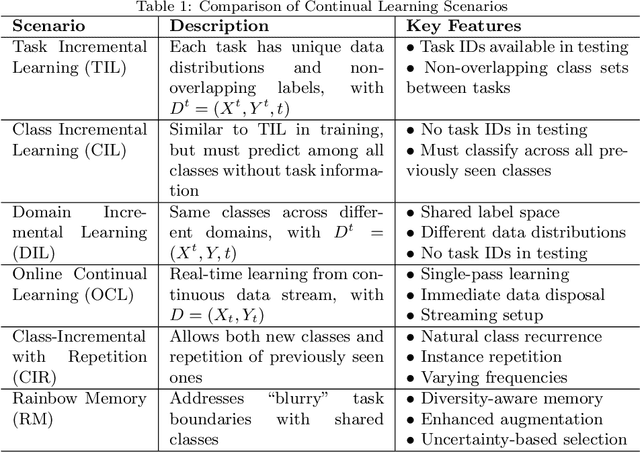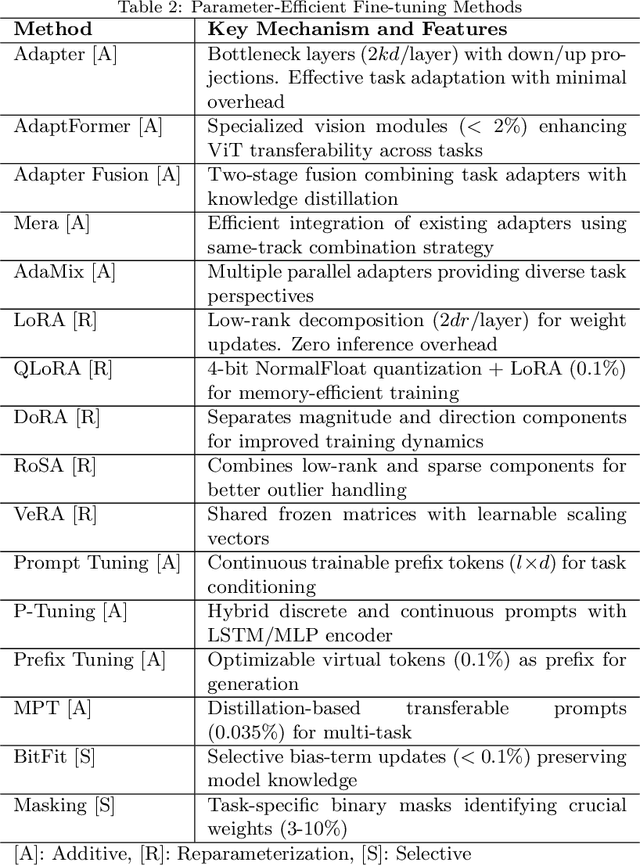Luigi Quarantiello
HAM: Hierarchical Adapter Merging for Scalable Continual Learning
Sep 16, 2025Abstract:Continual learning is an essential capability of human cognition, yet it poses significant challenges for current deep learning models. The primary issue is that new knowledge can interfere with previously learned information, causing the model to forget earlier knowledge in favor of the new, a phenomenon known as catastrophic forgetting. Although large pre-trained models can partially mitigate forgetting by leveraging their existing knowledge and over-parameterization, they often struggle when confronted with novel data distributions. Parameter-Efficient Fine-Tuning (PEFT) methods, such as LoRA, enable efficient adaptation to new knowledge. However, they still face challenges in scaling to dynamic learning scenarios and long sequences of tasks, as maintaining one adapter per task introduces complexity and increases the potential for interference. In this paper, we introduce Hierarchical Adapters Merging (HAM), a novel framework that dynamically combines adapters from different tasks during training. This approach enables HAM to scale effectively, allowing it to manage more tasks than competing baselines with improved efficiency. To achieve this, HAM maintains a fixed set of groups that hierarchically consolidate new adapters. For each task, HAM trains a low-rank adapter along with an importance scalar, then dynamically groups tasks based on adapter similarity. Within each group, adapters are pruned, scaled and merge, facilitating transfer learning between related tasks. Extensive experiments on three vision benchmarks show that HAM significantly outperforms state-of-the-art methods, particularly as the number of tasks increases.
Task-Agnostic Experts Composition for Continual Learning
Jun 18, 2025Abstract:Compositionality is one of the fundamental abilities of the human reasoning process, that allows to decompose a complex problem into simpler elements. Such property is crucial also for neural networks, especially when aiming for a more efficient and sustainable AI framework. We propose a compositional approach by ensembling zero-shot a set of expert models, assessing our methodology using a challenging benchmark, designed to test compositionality capabilities. We show that our Expert Composition method is able to achieve a much higher accuracy than baseline algorithms while requiring less computational resources, hence being more efficient.
Parameter-Efficient Continual Fine-Tuning: A Survey
Apr 18, 2025


Abstract:The emergence of large pre-trained networks has revolutionized the AI field, unlocking new possibilities and achieving unprecedented performance. However, these models inherit a fundamental limitation from traditional Machine Learning approaches: their strong dependence on the \textit{i.i.d.} assumption hinders their adaptability to dynamic learning scenarios. We believe the next breakthrough in AI lies in enabling efficient adaptation to evolving environments -- such as the real world -- where new data and tasks arrive sequentially. This challenge defines the field of Continual Learning (CL), a Machine Learning paradigm focused on developing lifelong learning neural models. One alternative to efficiently adapt these large-scale models is known Parameter-Efficient Fine-Tuning (PEFT). These methods tackle the issue of adapting the model to a particular data or scenario by performing small and efficient modifications, achieving similar performance to full fine-tuning. However, these techniques still lack the ability to adjust the model to multiple tasks continually, as they suffer from the issue of Catastrophic Forgetting. In this survey, we first provide an overview of CL algorithms and PEFT methods before reviewing the state-of-the-art on Parameter-Efficient Continual Fine-Tuning (PECFT). We examine various approaches, discuss evaluation metrics, and explore potential future research directions. Our goal is to highlight the synergy between CL and Parameter-Efficient Fine-Tuning, guide researchers in this field, and pave the way for novel future research directions.
LuckyMera: a Modular AI Framework for Building Hybrid NetHack Agents
Jul 17, 2023



Abstract:In the last few decades we have witnessed a significant development in Artificial Intelligence (AI) thanks to the availability of a variety of testbeds, mostly based on simulated environments and video games. Among those, roguelike games offer a very good trade-off in terms of complexity of the environment and computational costs, which makes them perfectly suited to test AI agents generalization capabilities. In this work, we present LuckyMera, a flexible, modular, extensible and configurable AI framework built around NetHack, a popular terminal-based, single-player roguelike video game. This library is aimed at simplifying and speeding up the development of AI agents capable of successfully playing the game and offering a high-level interface for designing game strategies. LuckyMera comes with a set of off-the-shelf symbolic and neural modules (called "skills"): these modules can be either hard-coded behaviors, or neural Reinforcement Learning approaches, with the possibility of creating compositional hybrid solutions. Additionally, LuckyMera comes with a set of utility features to save its experiences in the form of trajectories for further analysis and to use them as datasets to train neural modules, with a direct interface to the NetHack Learning Environment and MiniHack. Through an empirical evaluation we validate our skills implementation and propose a strong baseline agent that can reach state-of-the-art performances in the complete NetHack game. LuckyMera is open-source and available at https://github.com/Pervasive-AI-Lab/LuckyMera.
 Add to Chrome
Add to Chrome Add to Firefox
Add to Firefox Add to Edge
Add to Edge